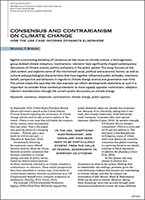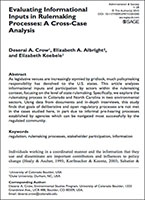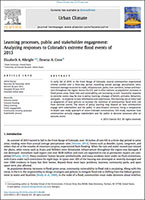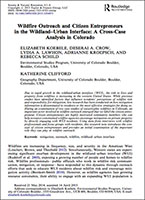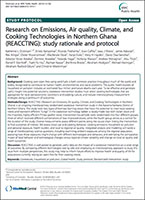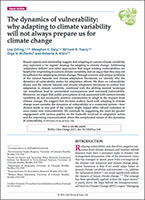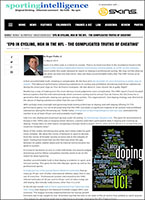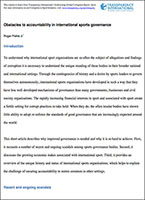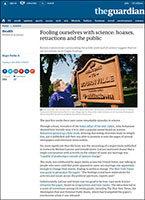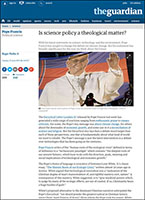|
by Maxwell T. Boykoff, Marisa M. McNatt and Michael K. Goodman, Chapter 18 in The Routledge Handbook of Environment and Communication, Edited by Anders Hansen, Robert Cox. 2015. Excerpt: Over the past few years, the number of Reuters stories about climate change has continued to decline. This was consistent with trends across other media outlets globally due largely to political economic trends of shrinking newsrooms and fewer specialist reporters covering climate stories with the same frequency as before. In 2010, The Wall Street Journal and The Christian Science Monitor closed their environmental blogs. Three years later, In January 2013, The New York Times dismantled its environment desk, assigning the reporters and editors to other departments, and discontinued its Green blog two months later. Read more ... |
by Anne U. Gold, David J. Oonk, Lesley Smith, Maxwell T. Boykoff, Beth Osnes, and Susan B. Sullivan, Journal of Geography 0: 1–12, 2015 Abstract: Learning about climate change is tangible when it addresses impacts that can be observed close to home. In this program, sixty-four diverse middle and high school students produced videos about locally relevant climate change topics. Graduate and undergraduate students provided mentorship. Read more ... |
by Emily Boyd, Aditya Ghosh, and Maxwell T. Boykoff, Chapter 8 in The Urban Climate Challenge: Rethinking the Role of Cities in the Global Climate Regime (Edited by C. Johnson, N. Toly, H. Schroeder), Routledge Press 2015 This chapter connects the more formal and emergent climate adaptation governance regime operating at multiple calls to everyday urban space, in the case of reoccurring flood events in Mumbai (Bombay), India...the collective climate future of Mumbai links to that of the larger story arc of India. The chapter examines how this relationship scales up to the international community and extends to other cities and contexts in relation to climate adaptation governance. |
by Maxwell Boykoff, Metode, April 2015 Abstract: Against a contrasting backdrop of consensus on key issues on climate science, a heterogeneous group dubbed climate «skeptics», «contrarians», «deniers» have significantly shaped contemporary discussions of climate science, politics and policy in the public sphere. This essay focuses on the USA context, and explores some of the intertwined social, political and economic factors, as well as cultural and psychological characteristics that have together influenced public attitudes, intentions, beliefs, perspective and behaviors in regards to climate change science and governance over time. Read more ... |
by Deserai A. Crow, Elizabeth A. Albright, and Elizabeth Koebele. Administration & Society, April 14, 2015 Abstract: As legislative venues are increasingly stymied by gridlock, much policymaking responsibility has devolved to the U.S. states. This article analyzes informational inputs and participation by actors within the rulemaking context, focusing on the level of state rulemaking. Specifically, we explore the rulemaking process in Colorado and North Carolina in two environmental sectors. Using data from documents and in-depth interviews, this study finds that goals of deliberative and open regulatory processes are not met in the cases studied here, in part due to informal pre-hearing processes established by agencies which can be navigated most successfully by the regulated community. Read more ... |
by Elizabeth A. Albright and Deserai A. Crow, Urban Climate, 14 July 2015 Abstract: In early fall of 2013 in the Front Range of Colorado, several communities experienced intense rainfall over a three-day period, exceeding annual average precipitation rates. Extensive damage occurred to roads, infrastructure, parks, river corridors, homes and business throughout the region. Across the U.S. and in other nations, as population increases in flood-prone areas, flood risks and vulnerability are increasing as well. Successful response to extreme events may be due to policy learning—changes of beliefs, attitudes, behaviors, and goals – in response to new information and experiences. This learning can at times lead to adaptation of local policies to increase the resilience of communities faced with risk from extreme events. The extent of policy learning may depend on how communities engage with stakeholders and the public in post-disaster recovery. Using a comparative in-depth case study approach of seven Colorado communities, this study examines how communities actively engage stakeholders and the public in decision processes after an extreme event. Read more ... |
by Elizabeth Koebele, Deserai A. Crow, Lydia A. Lawhon, Adrianne Kroepsch, Rebecca Schild and Katherine Clifford, Society & Natural Resources: An International Journal Abstract: Due to rapid growth in the wildland-urban interface (WUI), the risk to lives and property from wildfires is increasing in the western United States. While previous studies have identified factors that influence residents’ perceptions of wildfire risk and responsibility for mitigation, less research has been conducted on how mitigation information is disseminated to residents or the most effective strategies for doing so. During an examination of two case studies of catastrophic wildfires in Colorado, an important actor involved in wildfire outreach emerged that we label the citizen entrepreneur. Citizen entrepreneurs are highly motivated community members who can help resource-constrained wildfire agencies encourage mitigation on private property by directly engaging with WUI residents. Using data from interviews with wildfire professionals and focus groups with residents, this research note introduces the concept of citizen entrepreneurs and provides an initial examination of the important role they can play in wildfire outreach. Read more ... |
by Katherine L Dickinson, Ernest Kanyomse, Ricardo Piedrahita, Evan Coffey, Isaac J Rivera, James Adoctor, Rex Alirigia, Didier Muvandimwe, MacKenzie Dove, Vanja Dukic, Mary H Hayden, David Diaz-Sanchez, Adoctor Victor Abisiba, Dominic Anaseba, Yolanda Hagar, Nicholas Masson, Andrew Monaghan, Atsu Titiati, Daniel F Steinhoff, Yueh-Ya Hsu, Rachael Kaspar, Bre’Anna Brooks, Abraham Hodgson, Michael Hannigan, Abraham Rexford Oduro and Christine Wiedinmyer, BMC Public Health 2015, 15:126 Abstract: Cooking over open fires using solid fuels is both common practice throughout much of the world and widely recognized to contribute to human health, environmental, and social problems. The public health burden of household air pollution includes an estimated four million premature deaths each year. To be effective and generate useful insight into potential solutions, cookstove intervention studies must select cooking technologies that are appropriate for local socioeconomic conditions and cooking culture, and include interdisciplinary measurement strategies along a continuum of outcomes. Read more ... (See Research Highlight for further discussion of this project.) |
by Lisa Dilling, Meaghan Daly, William Travis, Olga Wilhelmi, and Roberta Klein, WIREs Climate Change 2015 Abstract: Recent reports and scholarship suggest that adapting to current climate variability may represent a ‘no regrets’ strategy for adapting to climate change. Addressing ‘adaptation deficits’ and other approaches that target existing vulnerabilities are helpful for responding to current climate variability, but we argue that they may not be sufficient for adapting to climate change. Through a review and unique synthesis of the natural hazards and climate adaptation literatures, we identify why the dynamics of vulnerability matter for adaptation efforts. Read more ... This paper was highlighted as a Nature Climate Change Research Highlight in Adaptation Policy: Forget No Regrets. |
by Roger Pielke, Jr. , Sporting intelligence, March 12. Excerpt: Sport, it is often said, is a mirror to society. That is no more true than in the revelations found in the report of the cycling independent reform commission, which earlier this week released its report on doping in professional cycling. We may not like what we see when we look into that mirror. Here are three uncomfortable truths that the CIRC forces us to confront. A first uncomfortable truth: cheating is complicated. Read more ... |
by Roger Pielke, Jr., Chapter in Global Corruption Report: Sport, Edited by G. Sweeney, Transparency International, 2015 Excerpt: To understand why international sport organizations are so often the subject of allegations and findings of corruption it is necessary to understand the unique standing of these bodies in their broader national and international settings. Through the contingencies of history and a desire by sports leaders to govern themselves autonomously, international sports organizations have developed in such a way that they have less well developed mechanisms of governance than many governments, businesses and civil society organizations. Read more ... |
by Roger Pielke Jr., The Guardian, June 2, 2015 Excerpt: The past few weeks have seen some remarkable episodes in science. Through a hoax, evocative of the Sokal Affair of the mid-1990s, John Bohannon showed how trivially easy it is to start a popular meme based on science. Bohannon ginned up a fake study showing that eating chocolate leads to weight loss, got it published and then was able to promote it onto the pages of several newspapers and television news outlets. Read more ... |
by Roger Pielke, Jr., The Guardian, June 23, 2015 Excerpt: With his latest statement on science, technology and the environment, Pope Francis has sought to change the debate on climate change. But his statement has broader significance for the way we think about the future. The Encyclical Letter Laudato Si’ released by Pope Francis last week has generated a wide range of reactions ranging from enthusiastic praise to uneasy criticism. Read more ... |






